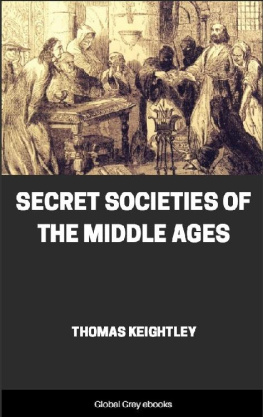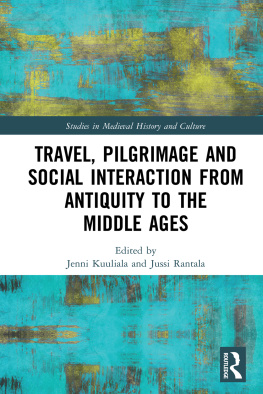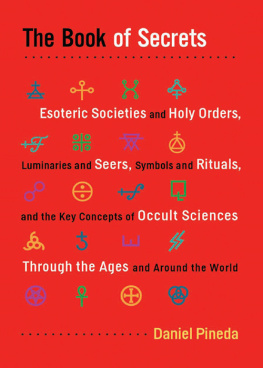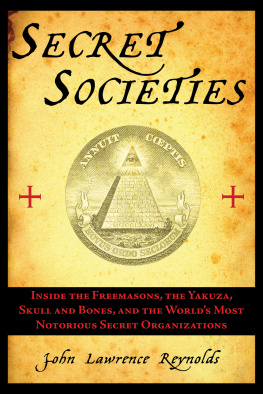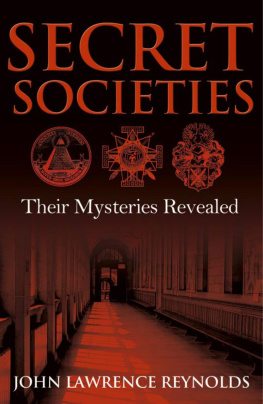Thomas Keightley - Secret Societies of the Middle Ages
Here you can read online Thomas Keightley - Secret Societies of the Middle Ages full text of the book (entire story) in english for free. Download pdf and epub, get meaning, cover and reviews about this ebook. year: 2018, publisher: Global Grey ebooks, genre: Religion. Description of the work, (preface) as well as reviews are available. Best literature library LitArk.com created for fans of good reading and offers a wide selection of genres:
Romance novel
Science fiction
Adventure
Detective
Science
History
Home and family
Prose
Art
Politics
Computer
Non-fiction
Religion
Business
Children
Humor
Choose a favorite category and find really read worthwhile books. Enjoy immersion in the world of imagination, feel the emotions of the characters or learn something new for yourself, make an fascinating discovery.
- Book:Secret Societies of the Middle Ages
- Author:
- Publisher:Global Grey ebooks
- Genre:
- Year:2018
- Rating:5 / 5
- Favourites:Add to favourites
- Your mark:
- 100
- 1
- 2
- 3
- 4
- 5
Secret Societies of the Middle Ages: summary, description and annotation
We offer to read an annotation, description, summary or preface (depends on what the author of the book "Secret Societies of the Middle Ages" wrote himself). If you haven't found the necessary information about the book — write in the comments, we will try to find it.
Secret Societies of the Middle Ages — read online for free the complete book (whole text) full work
Below is the text of the book, divided by pages. System saving the place of the last page read, allows you to conveniently read the book "Secret Societies of the Middle Ages" online for free, without having to search again every time where you left off. Put a bookmark, and you can go to the page where you finished reading at any time.
Font size:
Interval:
Bookmark:
SECRET SOCIETIES OF THE MIDDLE AGES
BY
THOMAS KEIGHTLEY
1837
Secret Societies of the Middle Ages by Thomas Keightley.
This edition was created and published by Global Grey
GlobalGrey 2018

globalgreyebooks.com
IF we had the means of investigating historically the origin of Secret Societies, we should probably find that they began to be formed almost as soon as any knowledge had been accumulated by particular individuals beyond what constituted the common stock. The same thing has happened to knowledge that has happened to all other human possessions,--its actual holders have striven to keep it to themselves! It is true that in this case the possessor of the advantage does not seem to have the same reason for being averse to share it with others which naturally operates in regard to many good things of a different kind; he does not, by imparting it to those around him, diminish his own store. This is true, in so far as regards the possession of knowledge considered in its character of a real good; the owner of the treasure does not impoverish himself by giving it away, as he would by giving away his money, but remains as rich as ever, even after he has made ever so many others as rich as himself. But still there is one thing that he loses, and a thing upon which the human mind is apt to set a very high value; he loses the distinction which he derived from his knowledge. This distinction really serves, in many respects, the same purpose that money itself does. Like money, it brings observation and worship. Like money, it is the dearest of all things, power. Knowledge, however held, is indeed essentially power; to ken, that is, to know, is the same word and the same thing with to can, that is, to be able. But there is an additional and a different species of power conferred by knowledge when it exists as the distinction of a few individuals in the midst of general ignorance. Here it is power not only to do those things the methods of doing which it teaches; it is, besides, the power of governing other men through your comparative strength and their weakness.
So strong is the motive thus prompting the possessor of knowledge to the exclusive retention of his acquisitions, that unless it had been met by another motive appealing in like manner directly to our self-interest, it appears probable that scarcely any general dissemination of knowledge would ever have taken place. The powerful counteracting motive in question is derived from the consideration that in most cases one of the most effective ways which the possessor of knowledge can take of exciting the admiration of others, is to communicate what he knows. The light must give itself forth, and illuminate the world, even that it may be itself seen and admired. In the very darkest times, the scholar or philosopher may find his ambition sufficiently gratified by the mere reputation of superior attainments, and the stupid wonder, or it may be superstitious terror, of the uninquiring multitude. But as soon as any thing like a spirit of intelligence or of curiosity has sprung up in the general mind, all who aspire to fame or consideration from their learning, their discoveries, or their intellectual powers, address themselves to awaken the admiration of their fellow-men, not by concealing, but by displaying their knowledge--not by scaling up the precious fountain, but by allowing its waters to flow freely forth, that all who choose may drink of them. From this time science ceases almost to have any secrets; and, all the influences to which it is exposed acting in the same direction, the tendency of knowledge becomes wholly diffusive.
But in the preceding state of things the case was altogether the reverse. Then there was little or no inducement to the communication of knowledge, and every motive for those who were in possession of it to keep it to themselves. There was not intelligence enough abroad to appreciate, or even to understand, the truths of philosophy if they had been announced in their simplicity, and explained according to their principles; all that was cared for, all that was capable of arousing the vulgar attention, was some display, made as surprising and mysterious as possible, of their practical application. It would even have been attended with danger in many cases to attempt to teach true philosophy openly, or to make open profession of it; it was too much in opposition to some of the strongest prejudices which everywhere held sway. It is not, then, to be wondered at, that its cultivators should have sought to guard and preserve it by means of secret associations, which, besides excluding the multitude from a participation in the thing thus fenced round and hidden, answered also divers other convenient purposes. They afforded opportunities of free conference, which could not otherwise have been obtained. There was much in the very forms of mystery and concealment thus adopted calculated to impress the popular imagination, and to excite its reverence and awe. Finally, the veil which they drew around their proceedings enabled the members of these secret societies to combine their efforts; and arrange their plans, in security and without interruption, whenever they cherished any designs of political innovation, or other projects, the open avowal and prosecution of which the established authorities would not have tolerated.
The facilities afforded by the system of secret association, and it may even be said the temptations which it presents, to the pursuit of political objects forbidden by the laws, are so great as to justify all governments in prohibiting it, under whatever pretence it may be attempted to be introduced. It is nothing to the purpose to argue that under bad governments valuable political reforms have sometimes been effected by such secret associations which would not otherwise have been attained. The same mode of proceeding, in the nature of the thing, is equally efficacious for the overthrow of a good government. Bad men are as likely to combine in the dark for their objects as good men are for theirs. In any circumstances, a secret association is an imperium in imperio, a power separate from, and independent of, that which is recognized as the supreme power in the state, and therefore something essentially disorganizing, and which it is contrary to the first principles of all government for any state to tolerate. In the case of a bad government, indeed, all means are fairly available for its overthrow which are not morally objectionable, the simple rule for their application being that it shall be directed by considerations of prudence and discretion. In such a case a secret association of the friends of reform may sometimes be found to supply the most effective means for accomplishing the desired end; but that end, however desirable it may be, is not one which the constitution of the state itself can rationally contemplate. The constitution cannot be founded upon the supposition that even necessary alterations of it are to be brought about through agencies out of itself, and farming no part of its regular mechanism. Whenever such agencies are successfully brought into operation, there is a revolution, and the constitution is at an end. Even the amendment of the constitution so effected is its destruction.
Yet most of the more remarkable secret associations which have existed in different ages and countries have probably either been originally formed to accomplish some political end, or have come to contemplate such an object as their chief design. Even when nothing more than a reformation of the national religion has been, as far as can be discovered, the direct aim of the association, it may still be fairly considered as of a political character, from the manner in which religion has been mixed up in almost every country with the civil institutions of the state. The effect which it was desired to produce upon the government may in many cases have been very far from extending to its complete abolition, and the substitution of another form of polity; an alteration in some one particular may have been all that was sought, or the object of the association may even have been to support some original principle of the constitution against the influence of circumstances which threatened its subversion or modification. Whether directed to the alteration or to the maintenance of the existing order of things, the irregular and dangerous action of secret combinations is, as we have said, a species of force which no state can reasonably be expected to recognize. But it may nevertheless have happened at particular emergencies, and during times of very imperfect civilization, that valuable service has been rendered by such combinations to some of the most important interests of society, and that they have to a considerable extent supplied the defects of the rude and imperfect arrangements of the ordinary government.
Next pageFont size:
Interval:
Bookmark:
Similar books «Secret Societies of the Middle Ages»
Look at similar books to Secret Societies of the Middle Ages. We have selected literature similar in name and meaning in the hope of providing readers with more options to find new, interesting, not yet read works.
Discussion, reviews of the book Secret Societies of the Middle Ages and just readers' own opinions. Leave your comments, write what you think about the work, its meaning or the main characters. Specify what exactly you liked and what you didn't like, and why you think so.

